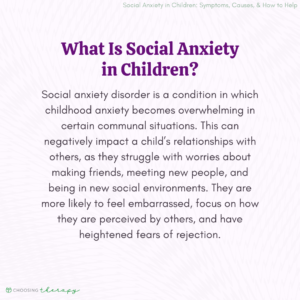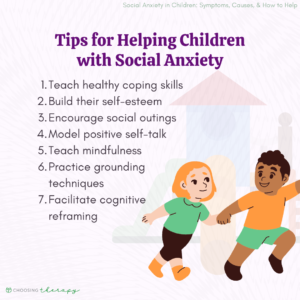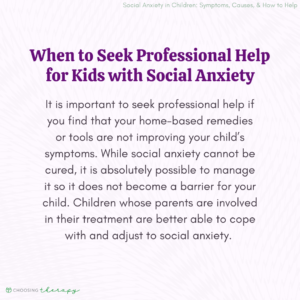Social anxiety in children can be hard to identify and notice, and goes far beyond feeling shy around new people. Children often feel insecure about how they are perceived or judged by peers, and fear when they may be put in uncomfortable situations where these insecurities are on display. However, there are both therapy and medication options available to help children cope with and manage symptoms.
Are you obsessively asking yourself “Am I a good parent?” Most parents occasionally ask themselves the question. However, if you are constantly worried about being a good parent and cannot control your fears, you might have OCD. Learn More
What Is Social Anxiety in Children?
Social anxiety disorder is a condition in which childhood anxiety becomes overwhelming in certain communal situations. This can negatively impact a child’s relationships with others, as they struggle with worries about making friends, meeting new people, and being in new social environments. They are more likely to feel embarrassed, focus on how they are perceived by others, and have heightened fears of rejection. These experiences differ from typical shyness, as they can become internalized by a child.1
Common symptoms of social anxiety in children include:
- Unhealthy self-consciousness in social situations
- Avoidance behaviors
- Feelings of sadness and helplessness
- Excessive sweating, stomach issues, or blushing
- Feeling anxiously attached to caregivers
- Self-isolation
Possible Causes of Social Anxiety Disorder in Children
There are many reasons a child may develop social anxiety disorder. These behaviors are affected by a number of factors including genetics, environment, among others. Social anxiety disorder is likely to develop following major life events or developmental milestones.2
However, it is important to note that experiencing symptoms of social anxiety is not indicative of a disorder, as social anxiety may occasionally pop up for children during times of stress or discomfort.
Social anxiety in children may be caused by:
Environmental Factors
Children learn and absorb a lot from their environments. They typically learn through observation, which begins at a very young age. Thus, it is believed that parenting styles may increase the risk of childhood social anxiety. For example, parents who choose to adopt an authoritarian approach, which focuses on a parent-led expectation of children’s behavior, can greatly influence a child’s self-esteem. Parents who behave negatively or harshly when their child acts out or exhibits emotion can result in the child accepting false truths about their self-worth.
To add, peer pressure can encourage children to participate in things they are uncomfortable with. Because of this, a child may find it easier to learn avoidance strategies, rather than simply refusing to engage. In turn, this can develop into social anxiety the longer it goes unaddressed. Bullying can be harmful, as children may avoid going to school or participating in activities they enjoy due to their negative experiences associated with these environments. Children may become anxious in these social situations, as they fear that they may be bullied or picked on again.4
Genetics
Many studies suggest that anxiety and other mental health issues can be genetic and passed down to children. A child is much more likely to display symptoms of anxiety or social anxiety if they have a parent with the same diagnosis. Therefore, some children may be more predisposed to anxiety disorders from birth, and further develop these behaviors themselves by imitating their parents.3
Brain Development & Functioning
Children who frequently experience intense feelings of fear, anger, or any other emotion are more likely to enter a ‘fight-or-flight’ mode. When this happens, their brain reprograms itself to respond in certain ways to specific situations. Social anxiety may result from poor coping skills, emotional regulation, or emotional expression. Thus, when these types of brain activity continue, social anxiety can increase.2
Help Your Children Develop & Be Happy
Online Therapy & Coaching (ages 1 -17) Bend Health is a virtual mental healthcare provider caring for kids, teens, and their families. Many insurance plans are accepted. Learn More
Charlie Health – Does your teen need additional mental health support? Charlie Health creates personalized treatment plans for young people (ages 11+) that include individual therapy, family therapy & curated peer groups. 92% of parents & caregivers would recommend Charlie Health to a friend or family member. Insurance accepted. Learn More
Thriveworks – In-person or Online Therapy – Therapy can change your child’s life. Connect with a licensed therapist online or in-person, and cover most of the cost with your insurance. Click here to Find A Therapist or call (877) 314-3813
7 Tips for Helping Children With Social Anxiety
There are a lot of ways for parents to support their child with social anxiety. Doing so can be helpful both at home and at school in collaboration with a teacher or school counselor. It’s important to make this a team approach, and ensure that your child is receiving the same support from every trusted adult in their life.
Below are seven tips for helping a child with social anxiety:
1. Teach Healthy Coping Skills
Teaching a child healthy coping mechanisms is beneficial when dealing with social anxiety. It’s crucial that children know and are able to access tools to help them with self-soothing techniques, and also that parents model these behaviors at home.
2. Build Their Self-Esteem
Parents should continuously focus on building a child’s self-esteem, especially for a child with social anxiety. Try encouraging your child to share their opinions and feelings, offering reassurance and validation, and working on creating a secure attachment with your child. Other family members and trusted adults can also support you with this. Children who have higher self-esteem are more likely to bounce back from negative experiences at school and from other children.
3. Encourage Social Outings
Helping your child with anxiety remain open to social gatherings and situations is important, as these experiences offer them with new learning opportunities. By not avoiding uncomfortable situations, your child can identify new tools to manage their anxiety. Engaging your child in team sports or group activities can be a great way to keep them excited about something and lessen symptoms. If they are engaged in an activity they care about and that brings them joy, it will make certain social situations feel safer.
4. Model Positive Self-Talk
Children learn by observing. If we as parents are exhibiting a lot of anxiety ourselves, this can certainly give children the wrong message about how they are to behave. It’s important that we care for ourselves and ensure we are practicing healthy self-talk so children can learn how to do so themselves.
5. Teach Mindfulness
Mindfulness is beneficial for adults, but showing children how to behave mindfully can help them learn new ways to calm themselves when they are overwhelmed. It is a great way to reduce feelings of anxiety and restless thoughts.
6. Practice Grounding Techniques
Grounding techniques are helpful for children to access when they are overwhelmed. Grounding brings our focus back to ourselves and our body in a given moment. By showing this to our children, we are teaching them to recognize how they can handle anxious thoughts when they arise, and offer guidance and encouragement along the way.
7. Facilitate Cognitive Reframing
This is helpful for children who engage in catastrophic thinking. Cognitive reframing encourages children to look at the same situation from a positive lens. Since anxiety is often rooted in ‘worst case scenario’ mentalities and not reality, cognitive reframing helps children learn that not all of their thoughts are accurate.5
Charlie Health - Therapy Once Per Week Isn’t Always Enough Charlie Health’s virtual mental health program includes curated peer groups, individual therapy, and family therapy for teens and young adults with serious mental health issues. Insurance accepted. Learn More
When to Seek Professional Help for Kids with Social Anxiety
It is important to seek professional help if you find that your home-based remedies or tools are not improving your child’s symptoms. While social anxiety cannot be cured, it is absolutely possible to manage it so it does not become a barrier for your child. Children whose parents are involved in their treatment are better able to cope with and adjust to social anxiety.
Treatment options for a child with social anxiety include:
Therapy
Therapy is great for children with social anxiety, as it offers them a safe space to talk about their feelings in a private, one-on-one setting. Parents can offer their child encouragement by expressing trust in the process. Further, they can feel at ease with the understanding that therapy isn’t a reflection of their parenting, but rather a reflection of how much they love their child. To find the right therapist for your child, consider speaking with their pediatrician or using an online therapist directory to identify therapists with the proper expertise.
Therapy options for children with social anxiety include:
- Cognitive behavioral therapy (CBT): CBT for kids helps children learn ways to reprogram their thoughts and actions, so they can feel more in control of their emotions.5
- Family therapy: Family therapy is an approach that involves the whole family, and focuses on how familial dynamics may contribute to a child’s social anxiety. It ensures that all family members have an equal say, with an emphasis on understanding the parental impact on children.
- Mindfulness-based cognitive therapy (MBCT): MBCT helps children feel more at ease and in control, as they are taught to take a step back from their situation mindfully.
- Play therapy: Play therapy offers children the ability to work through tough emotions through play and thus associate these feelings with positive experiences.
- Group Therapy: Group therapy is a great way for children to learn social skills, work through feelings of insecurity, and practice communication with other children.
Medications
Medications for SAD may be recommended for some children, and SSRIs are the most common type prescribed for the treatment of social anxiety.6
Final Thoughts
If your child or a child you love appears to be struggling with social anxiety, there are plenty of support options available to help you both find ways to manage this, work through it, and live fulfilling lives. Don’t lose hope! Working with a therapist is a great way to learn how to move forward in healthy ways. Together you can come up with a plan and strategy to help your child feel more comfortable in their own skin.
Additional Resources
To help our readers take the next step in their mental health journey, Choosing Therapy has partnered with leaders in mental health and wellness. Choosing Therapy is compensated for marketing by the companies included below.
Online Therapy & Coaching (ages 1 -17)
Bend Health is a virtual mental healthcare provider caring for kids, teens, and their families. Many insurance plans are accepted. Learn More
Virtual Therapy For Teens
Charlie Health creates personalized treatment plans for young people (ages 11+) that include individual therapy, family therapy & curated peer groups. 92% of parents & caregivers would recommend Charlie Health to a friend or family member. Insurance accepted. Learn More
In-person Or Online Therapy For Children & Teens
Thriveworks – Therapy can change your child’s life. Connect with a licensed therapist online or in-person, and cover most of the cost with your insurance. Click here to Find A Therapist or call (877) 314-3813
Online Therapy
TeenCounseling (ages 13 -19) – Help your child thrive with professional counseling. Get matched with a licensed therapist who specializes in teens. Discuss your child’s issues and situation. When you approve, the therapist is connected with your child. The therapist interacts with your child over text, phone, and video. Starting for as little as $65 per week. Get Started
OCD and Children
NOCD – What are the signs of OCD in children? OCD involves unwanted intrusive thoughts, images, or urges (obsessions) that create anxiety, which the child attempts to relieve by performing rituals (compulsions). These rituals can be overt and noticeable (e.g. handwashing, counting, avoiding objects, rearranging materials, etc.) or can be less noticeable or mental (e.g. silently analyzing, reiterating phrases, counting, etc.). To find out if your child has OCD and treatment options, schedule a free 15 minute call with NOCD.
How to Find & Choose the Right Therapist for Your Child Discovering and selecting the right therapist for your child often comes down to two things: research and persistence. Be willing to put in the time and effort to call around to different therapists or therapy organizations in your area. Read through therapist profiles to see if their style, approach, and expertise resonate with you and your child.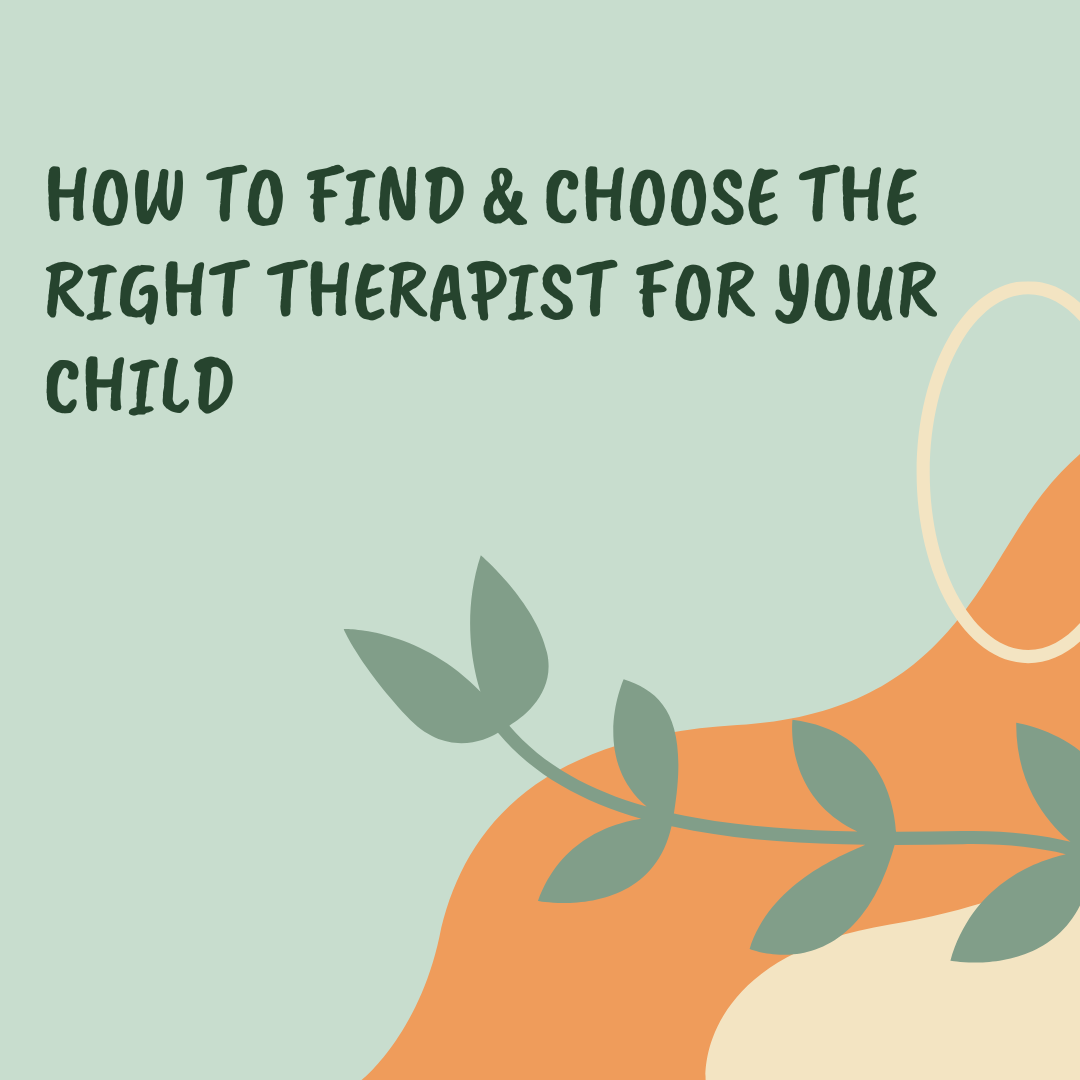
Depression in Children: Signs, Symptoms, & Treatments If you or someone you know is concerned about symptoms related to depression, seeking professional help from a mental health provider is highly recommended. Licensed professional counselors, social workers, psychologists, or psychiatric medication prescribers are able to determine whether a person is experiencing depression and the best methods of treatment.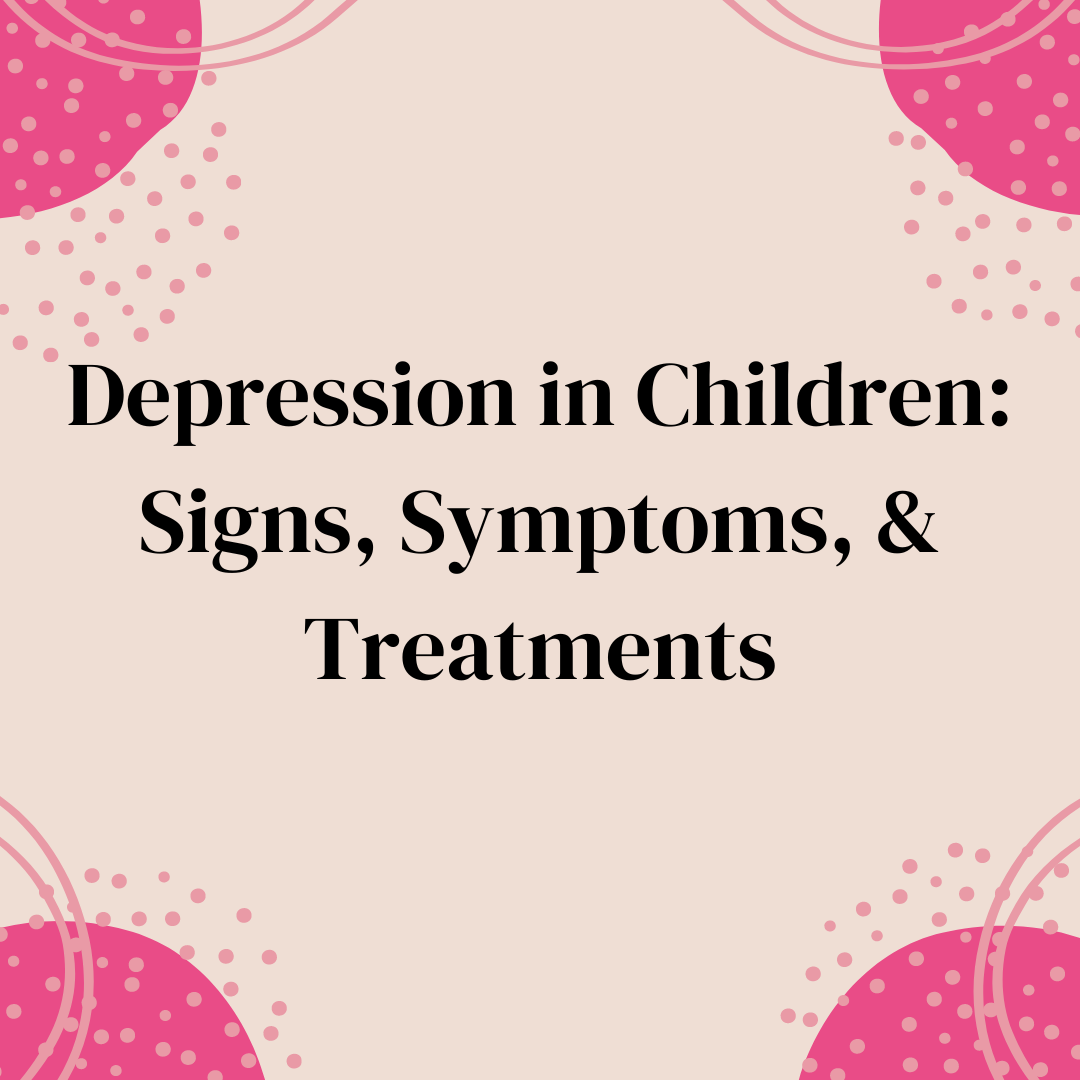
Find a therapist for social anxiety
Get the help you need from a therapist near you
City or zip Search



